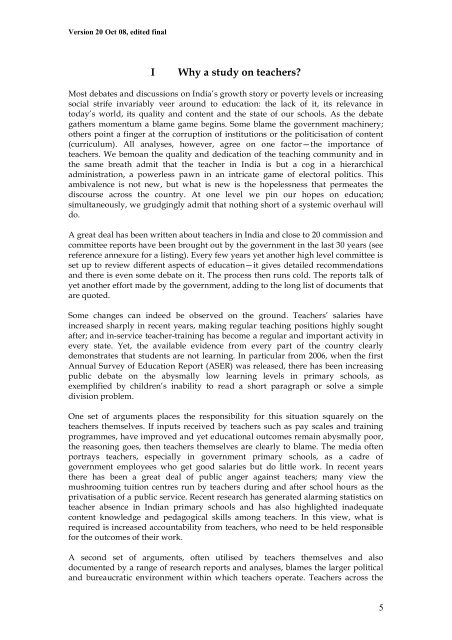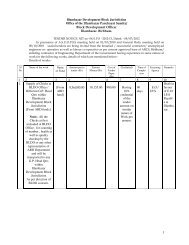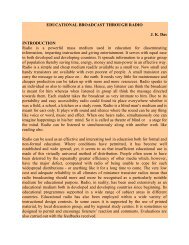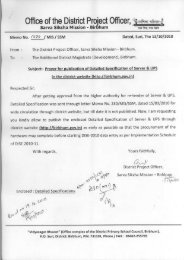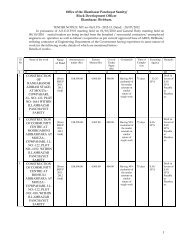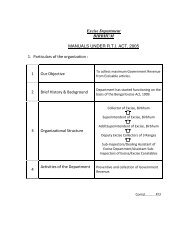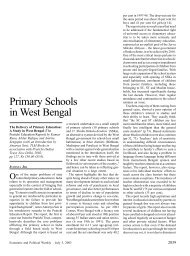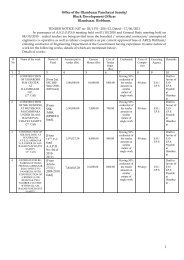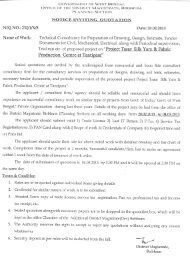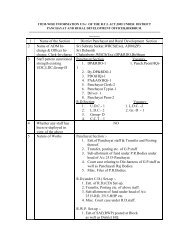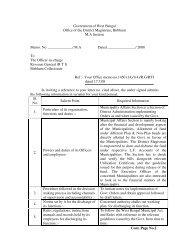primary school teachers the twists and turns of ... - ERU Consultants
primary school teachers the twists and turns of ... - ERU Consultants
primary school teachers the twists and turns of ... - ERU Consultants
You also want an ePaper? Increase the reach of your titles
YUMPU automatically turns print PDFs into web optimized ePapers that Google loves.
Version 20 Oct 08, edited finalIWhy a study on <strong>teachers</strong>?Most debates <strong>and</strong> discussions on India’s growth story or poverty levels or increasingsocial strife invariably veer around to education: <strong>the</strong> lack <strong>of</strong> it, its relevance intoday’s world, its quality <strong>and</strong> content <strong>and</strong> <strong>the</strong> state <strong>of</strong> our <strong>school</strong>s. As <strong>the</strong> debatega<strong>the</strong>rs momentum a blame game begins. Some blame <strong>the</strong> government machinery;o<strong>the</strong>rs point a finger at <strong>the</strong> corruption <strong>of</strong> institutions or <strong>the</strong> politicisation <strong>of</strong> content(curriculum). All analyses, however, agree on one factor—<strong>the</strong> importance <strong>of</strong><strong>teachers</strong>. We bemoan <strong>the</strong> quality <strong>and</strong> dedication <strong>of</strong> <strong>the</strong> teaching community <strong>and</strong> in<strong>the</strong> same breath admit that <strong>the</strong> teacher in India is but a cog in a hierarchicaladministration, a powerless pawn in an intricate game <strong>of</strong> electoral politics. Thisambivalence is not new, but what is new is <strong>the</strong> hopelessness that permeates <strong>the</strong>discourse across <strong>the</strong> country. At one level we pin our hopes on education;simultaneously, we grudgingly admit that nothing short <strong>of</strong> a systemic overhaul willdo.A great deal has been written about <strong>teachers</strong> in India <strong>and</strong> close to 20 commission <strong>and</strong>committee reports have been brought out by <strong>the</strong> government in <strong>the</strong> last 30 years (seereference annexure for a listing). Every few years yet ano<strong>the</strong>r high level committee isset up to review different aspects <strong>of</strong> education—it gives detailed recommendations<strong>and</strong> <strong>the</strong>re is even some debate on it. The process <strong>the</strong>n runs cold. The reports talk <strong>of</strong>yet ano<strong>the</strong>r effort made by <strong>the</strong> government, adding to <strong>the</strong> long list <strong>of</strong> documents thatare quoted.Some changes can indeed be observed on <strong>the</strong> ground. Teachers’ salaries haveincreased sharply in recent years, making regular teaching positions highly soughtafter; <strong>and</strong> in-service teacher-training has become a regular <strong>and</strong> important activity inevery state. Yet, <strong>the</strong> available evidence from every part <strong>of</strong> <strong>the</strong> country clearlydemonstrates that students are not learning. In particular from 2006, when <strong>the</strong> firstAnnual Survey <strong>of</strong> Education Report (ASER) was released, <strong>the</strong>re has been increasingpublic debate on <strong>the</strong> abysmally low learning levels in <strong>primary</strong> <strong>school</strong>s, asexemplified by children’s inability to read a short paragraph or solve a simpledivision problem.One set <strong>of</strong> arguments places <strong>the</strong> responsibility for this situation squarely on <strong>the</strong><strong>teachers</strong> <strong>the</strong>mselves. If inputs received by <strong>teachers</strong> such as pay scales <strong>and</strong> trainingprogrammes, have improved <strong>and</strong> yet educational outcomes remain abysmally poor,<strong>the</strong> reasoning goes, <strong>the</strong>n <strong>teachers</strong> <strong>the</strong>mselves are clearly to blame. The media <strong>of</strong>tenportrays <strong>teachers</strong>, especially in government <strong>primary</strong> <strong>school</strong>s, as a cadre <strong>of</strong>government employees who get good salaries but do little work. In recent years<strong>the</strong>re has been a great deal <strong>of</strong> public anger against <strong>teachers</strong>; many view <strong>the</strong>mushrooming tuition centres run by <strong>teachers</strong> during <strong>and</strong> after <strong>school</strong> hours as <strong>the</strong>privatisation <strong>of</strong> a public service. Recent research has generated alarming statistics onteacher absence in Indian <strong>primary</strong> <strong>school</strong>s <strong>and</strong> has also highlighted inadequatecontent knowledge <strong>and</strong> pedagogical skills among <strong>teachers</strong>. In this view, what isrequired is increased accountability from <strong>teachers</strong>, who need to be held responsiblefor <strong>the</strong> outcomes <strong>of</strong> <strong>the</strong>ir work.A second set <strong>of</strong> arguments, <strong>of</strong>ten utilised by <strong>teachers</strong> <strong>the</strong>mselves <strong>and</strong> alsodocumented by a range <strong>of</strong> research reports <strong>and</strong> analyses, blames <strong>the</strong> larger political<strong>and</strong> bureaucratic environment within which <strong>teachers</strong> operate. Teachers across <strong>the</strong>5


